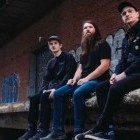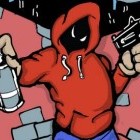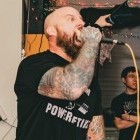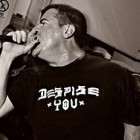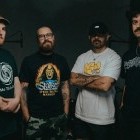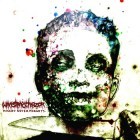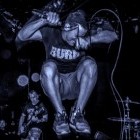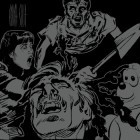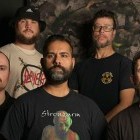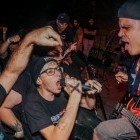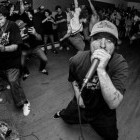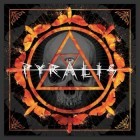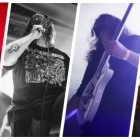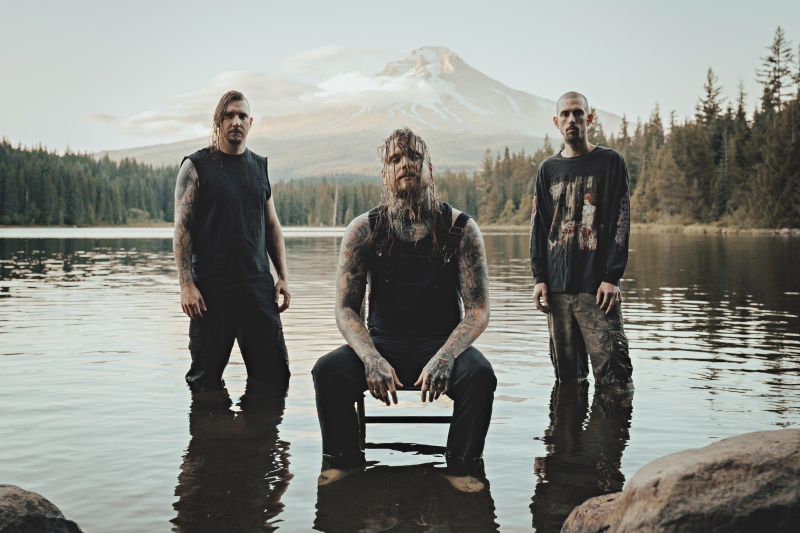
In the athletic world of metal guitar, it’s usually the players who are speaking the loudest that monopolize the attention of the masses. Their chops are bright and acrobatic, cultivated through countless hours of repetition at the edge of a poorly assembled futon in their bedroom. There’s something very naturally impressive about performing or executing something that is so clearly outside our personal realm of ability. I imagine that’s why hyper realism is so popular in visual art among non connoisseurs. It doesn’t require a sophisticated understanding of the medium to appreciate how virtuosic the work is. I think shred guitar offers the same appeal. Its complexity is obvious and dazzling. But as time consuming as it is to develop, it’s ultimately a game of hours clocked and commitment that has little bearing on the quality of your creative fruits.
“To the viewer, who has little emotional investment in how the work gets done, art made primarily to display technical virtuosity is often beautiful, striking, elegant… and vacant.” - David Bayles
This has resulted in an ebb and flow of the popularity of technical playing as it swells in and out of vogue. Now, don’t get me wrong, I’m an Yngwie apologist and regularly lean on his timeless mantra of “more is more” when working on my own music, but I want to take a moment to shine light on some players that I believe to be next level in a less conventional way. These guys might not overwhelm you with blistering pentatonic runs, but their work is complex and satisfying on their own terms, and most importantly, showcases a unique and personal voice.
Paolo (Putridity)
Putridity is a band that holds a place near and dear to my heart. I respect a band that is committed and unified in their goal, and for Putridity that goal is blurring the line between listenability and incoherent brutality with liters of piss and vomit. Upon first listen it’s easy to be distracted into believing the drums steer the ship, but once your ears are calibrated you’ll find that it’s Paolo’s riffs that are responsible for the deranged nature of their sound. His playing can only be described as alien. His right hand is a fucking wood chipper and he has found harmonics I have yet to discover myself. He has weaponized the guitar in an effort to disorient and eradicate the human race. It’s rare for me to be left scratching my head after listening to most modern metal players, but Paolo’s riffs manage to leave me stumped. I genuinely have no idea what he’s doing to create some of the sounds he manages to strangle out. But he does so with such confidence and precision that it leaves no question of their purpose. And that mystery to his playing is such a rare and inspiring quality. For a great example of this I’d recommend "Conceived Through Vermination," the intro track from my favorite album of 2015, Ignominious Atonement.
Steve Jansson (Crypt Sermon)
Now, Steve doesn’t fit the bill of a player whose next level approach is demonstrated in an unorthodox way, necessarily. Steve’s ability is as clear as it gets. He’s a true American shredder, the Clark Kent of classic lead players, the varsity quarterback of shred with content, you get it. His leads aren’t avant-garde or rule breaking, but they are a triumphant example of the torch of killer, melodic, musical shred being carried into the next generation. He wears the influences of Jason Becker, Paul Gilbert, and Kirk Hammett with pride. The greatest tool a capable shredder has at their disposal is restraint, and Steve has it in spades. His playing demonstrates as much reverb soaked vibrato and open vibing leads as it does whipping alternate picking and time earned chops. His playing, much like Crypt Sermon’s approach to doom, is a cool glass of water in a desert of contrived bullshit. You will find evidence of this in the solo near the end of Into the Holy of Holies and the anthemic lead that follows from their 2015 album, Out of the Garden.
Gene Palubicki (Angelcorpse, Perdition Temple)
There’s a reason I consider the mid to late '90s as being the golden age of death metal, and that’s because RIFF WAS FUCKING KING. It wasn’t about Berklee grads and neo-classical shred. It was that beautiful and sweet suspended moment in time where death metal was still a fetal offering from thrash and speed metal and it bore their markings; more conventional song structures, militant right hands, and the art of the riff being the only truth. And while Gene’s bands might not be unknown, his position as one of death metal’s finest craftsman is far from cemented in popular opinion. I believe he’s worthy of standing shoulder to shoulder with Rob Barrett, Phil Fasciana, and Robert Vigna as a titan of the riff. He’s certainly no slouch as a lead player either, but his relentless songwriting is what causes him to stand out as being one of my all time favorites and primary influences. His songs answer the question, what would Marduk sound like as a death metal band? Angelcorpse might have more clout, but my favorite effort from Gene has to be Perdition Temple’s debut LP, Edict of the Antichrist Elect. This album is effectively a solo record a la Old Man’s Child where he hired a drummer to track the songs. But the guitars, bass, and vocals are all Gene. If you want to dive in to some of his timeless riffing, you really can’t go wrong anywhere, but I’d recommend "In the Name of a Newborn Tyrant," the third track on Edict of the Antichrist Elect.
Jake Wilkes (Disentomb)
I was torn between Christian Kuhn of Defeated Sanity and Jake Wilkes for this entry. As much as I believe Christian to be one of the greatest players in metal currently, I gave it to Jake because he fits the bill of this list more appropriately as being a lesser known player. The decision was between those two because Jake is a clear disciple of Christian’s playing. They are both masters of overstimulating the listener with highly complicated single note riffs then launching into a swinging groove right before your brain turns completely into blended shit. Jake Wilkes is a fucking madman, and his notoriety as a grade A extreme metal guitarist isn’t lacking simply due to his young career, but also due to the marketing of his band. Disentomb is commonly regarded as a slam band, or most generously a brutal death band. And while Jake can slam with the best of them, all of his riffs are pregnant with nuanced, and not so nuanced, complexity. His approach to death metal guitar is so fresh and unique while showing a complete disregard for flash and self indulgence. It’s all about creating a twisted final product. Well Jake, I see you, man. You’re not fooling me. Here’s his playthrough video for "Chthonic Gateways" from Disentomb’s sophomore LP, Misery.
Dagon (Inquisition)
Dagon being on this list might cause some eyes to roll. I mean, who hasn’t heard of Inquisition? For better or for worse. Whether it be from articles documenting political drama, his polarizing signature Abbath “croak,” or you’re simply a fan of the band, you really have to live under a rock to not be aware of Inquisition if you're a fan of metal. But among the long list of reasons you may have discussed Dagon or Inquisition in the past, it’s likely his playing wasn’t central to the conversation. I truly believe Dagon to be the most underrated player in metal today. And maybe that’s because every aspect of that band speaks so loudly. Their aesthetic, the orthodox Satanic themes, the fact they’re a two-piece, everything about the band seems to draw attention away from the foundation of their sound. Dagon’s approach to guitar is so wildly unique that even with the guitar isolated you’d know you’re listening to Inquisition within 10 seconds of any given song. He approaches the guitar like a black metal harpist. He’s rarely playing less than all six strings. Massive currents of warbled chords inhaling and exhaling.
He doesn’t play to any of the tropes or expectations of black metal. His playing seems to exist in a vacuum where strings never go unbent and Floyd Rose tremolo arms have been rendered obsolete. His manipulation of the floating bridge with nothing but his fingers and the palm of his hand has become nothing short of iconic for me. His playing is haunting, hypnotic, and fiercely independent, both literally and figuratively. His ability to fill the sonic space as a two piece while leaving nothing to be desired is impressive enough, but his journey to develop a sound so far removed from any other, that's his true achievement. Here’s a track from the record where his playing was finally celebrated in the production, "Joined by Dark Matter, Repelled by Dark Energy," off of Obscure Verses for the Multiverse.



